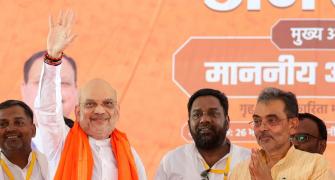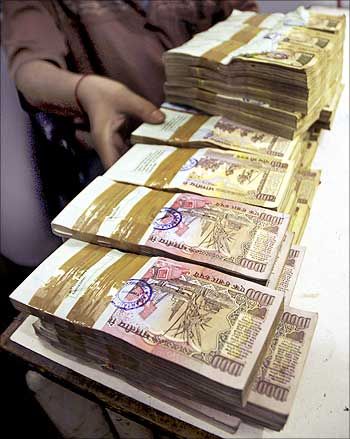The main focus during the two-day Chintan Shivir to be held in Jaipur over the weekend would be on the political discussion and how the party plans to strategise to win back the mandate it received in 2004 and 2009, reports Renu Mittal.
The position paper prepared by this sub-group titled Emerging Political Challenges and headed by Union Defence Minister A K Antony has highlighted four points, around which the discussions will revolve.
The paper is a base document and the meeting would use the points raised by the paper to debate, discuss, provide solutions or alternatives and in short, devise a sound political policy with which to go to approach the next general elections.
The first point would be to elaborate and enumerate the strategic challenges in 2014 and discuss how these challenges can be overcome.
The second is coalitions and how to make new friends and win more allies. It was the Congress party's decision in Shimla in 2003, to open itself to allies and alliances and be ready to form a coalition government, which helped them to bridge the deficit in certain key states, and on the basis of those alliances, the United Progressive Alliance was formed.
This new coalition defeated the Bharatiya Janata Party-led National Democratic Alliance in 2004, and now in 2013, the Congress finds it would need to continue with its alliances since they are already in power with them.
With over a year-and-a-half to go before the next general elections, the Congress cannot at this stage dump its allies and go alone since it would firstly run the risk of losing its government and second, it has not suitably strengthened itself in numerous states to be able to go ahead and give a clarion call to go alone.
The party would stick with its allies and give a call to bring in newer alliance partners where it is alone. The Congress leadership's thinking on this issue appears to be clear: it is not in a position to dump its allies just yet.
The third aspect which the paper has focused on is the need to re-engage with urban India, where the party feels it is on a losing wicket. In 2009, the Congress won elections in every big city of urban India from Trivandrum to Jammu.
But now, the feedback and the various elections have shown a major estrangement between the Congress and the people of urban India which means the disillusionment of the middle classes with the Congress party. For example, in Gujarat, the Congress lost heavily in urban areas.
It is felt there is a need to pr-actively engage with urban India if the Congress has to keep its electoral moorings strong in the next election. Linked to this, are anti-corruption campaigns which ran against the Congress and the government last year in various cities under the leadership of Anna Hazare, Arvind Kejriwal and other members of the civil society.
Coupled with this is the disillusionment of the youth with the Congress with students and other youth organisations coming on the streets to protest against corruption and in the latest incident of the gang-rape of a young woman in Delhi, which shook the conscience of the nation and showed how unsafe the country is for women along with gaping holes in the security apparatus, the behaviour of the police and administration and the defunct public transport system.
The fourth aspect highlighted is the identification of Congress adversaries not only nationally but state wise also. It is felt that with the considerable weakening of the BJP, it is no longer a strong monolithic challenge for the congress. Instead the party has more need to worry about state players and parties.
For example, the congress feels that in Maharashtra the bigger challenge is from the Shiv Sena and not the BJP, particularly in Mumbai and it would therefore need to devise a strategy on how to specifically target the Shiv Sena and overcome the challenge from it.
In Punjab, the party feels the main challenge is from the Akali Dal and not the BJP and the Congress would accordingly need to devise its strategy. According to a senior leader it would have to be a more segmented state specific approach which alone can yield dividends rather than a continued and mindless attack on the BJP.
Along with this there are also serious concerns that with economic liberalisation having taken a commanding position in the last two decades, there is a need to cohesively and lucidly redefine and marry social initiatives with economic reforms.
This issue has come from a certain alienation felt by the aam admi when it comes to economic reforms and how the ideological moorings can be redefined to straddle both reforms and social initiatives.
Senior leaders admit that the most difficult and uphill task they face is on the economic front where there are no easy solutions, where prices are on the rise, where inflation is still up and where the cut in subsidies has taken a toll on the common man's perception that the UPA government has given them nothing but 'mehngai'. It is felt this is the biggest challenge before the government and the party today.







